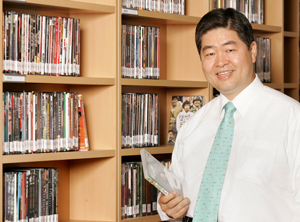|
FROM:
 |
[Korea Joongang Daily/ May 09] Future is in culture, energy group head asserts
May 09, 2006 - The semiconductor industry changed the map of Korean industry over the last 50 years, "but over the next 50 years the culture industry will change not only the industry map of Korea but of the whole world too," said David Younghoon Kim, chairman of Daesung Group.
Daesung Group, one of Korea's oldest energy companies, has recently been remodelling its businesses radically.
The company - which revolutionized the household energy business during the 1960s and 1970s with the mass production of charcoal briquettes and became one of Korea's top 10 conglomerates - has set its sights on the culture industry as a future engine for growth.
Daesung Group has become a major player in the movie industry, investing in a string of hit Korean movies, including "Oldboy," "Welcome to Dongmakgol," and "Marathon."
After purchasing a 20-percent stake in the U.S. mobile game producer GenPlay last year, Daesung Group sealed the acquisition of the Korean portal Website, Korea.com, earlier this year. The company is also lining up a big push into online education, or e-learning.
The power behind these sweeping changes is David Younghoon Kim, current chairman of Daesung and third son of its founder, Soo Keun Kim. Once an aspiring pastor, the younger Kim now proselytizes for the culture industry, as the Joong-Ang Daily found out in a recent interview with him.
Q. Energy and culture are completely different industries. Why did Daesung decide to focus on cultural services?
A. For any company to consistently grow, it needs to change its growth engine continually. The market for culture businesses was worth 1.4 trillion won ($1.49 billion) last year, which is thought to exceed the value of the information technology hardware market. The fate of a company will be decided by who is willing to take the initiative with the culture industry. Let me illustrate with a little anecdote. Daesung made a lot of money in the 1960s through its briquette business. A Korean-American economist, who had heard about Daesung's success, approached its founder and suggested that the company invest in semiconductors.
At that time Samsung and Daesung were both similar in size and had little experience in the semiconductor business. Samsung, however, went on to invest in semiconductors while Daesung ignored the advice.
Fifty years later, the gap between the two conglomerates is plain for all to see.
Over the next 50 years, the culture industry will change not only the industry map of Korea but of the whole world too.
{C}
 |
David Younghoon Kim, chairman of Daesung Group, holding a DVD of a Korean movie, "Marathon," in which his company invested. Mr. Kim has donated a large number of personal DVDs and books to employees. By Kang Uk-hyun
Q. Daesung has successfully invested in movies. Portal Web sites, however, are a completely new field for Daesung. Given that many conglomerates have been burned by investing in portal sites, how do you plan on managing Korea.com?
A. It is a fact that Korea.com has not taken full advantage of its brand name. It is necessary to find a strategy that differentiates Korea.com from other Web sites while making it a portal site that represents Korea. To achieve this we are looking into ways of m
|








